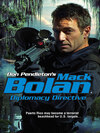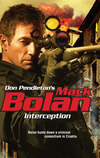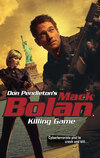Kitabı oku: «Patriot Play», sayfa 3
CHAPTER FOUR
Stony Man Farm, Virginia
The digital and fingerprint images sent from Bolan were in the system, being scanned by the FBI’s AFIS recognition program. Kurtzman also had them being scanned by military databases and any other recognition systems he could work into his search. Huntington Wethers was taking his turn watching the scans running across his monitors. It was just over an hour when he got his first hit.
“We got one,” he called.
Kurtzman rolled up to Wethers’s workstation as a hard copy slid from the printer. He snatched it up and scanned the information.
“There it is,” he said. “Henry Jacks. He’s done time for assault. Over the past ten years he’s been associated with three different militia groups. Guess who he’s been with the last three years? The Brethren. He hates the government and doesn’t agree with anything they do. He has been quoted as saying ‘when we burn you down, it will be a new day for real Americans.’”
“His burning days are over,” Wethers said.
“Let me run a check on known associates,” Kurtzman said. “We might hit lucky.”
It was quickly found that Jacks’s two closest friends were both members of the Brethren, and a cross-check revealed they had both died in the assault on Jerome Gantz’s Tyler Point home.
Carmen Delahunt, who had been quietly monitoring her data input, called for Kurtzman’s attention. “A news service in Washington just received a claim from a group calling itself America the Free. They are saying they are responsible for the recent bombings, and there are more to come.”
“New name to me,” Kurtzman said.
“I just ran a trace through FBI files,” Delahunt said. She was former FBI herself, so her knowledge of their procedures was a great help to Stony Man. “There’s no data on such a group. But the information they included in their claim is pretty close to what the FBI has on the bombings.”
Kurtzman pondered on that. “Okay, Carmen, you stay on that for a while. See what else you can find on America the Free. There’s something odd in this. Let’s see if we can dig it up.”
Kurtzman relayed the current information to Bolan and advised they were continuing with the identification of the others involved.
Tyler Bay Hotel
ADDITIONAL INFORMATION came through the laptop, and it was Bolan’s turn to check the screen when another Brethren connection popped up. He found himself staring at an image that took him back to the Gantz house and the boat retreating into the fog shrouding the bay.
The image stared at him from the screen. A long, lean-featured face. The stare was hard and direct, and above it the hair was pale and cut short. It was the man Bolan had seen at the stern rail. He had been right at the time—it was a face he wouldn’t forget. He called Lyons to take a look.
“He’s the one I spotted on the boat just as it pulled away. Deacon Ribak. One of the Brethren’s top lieutenants. Ex-Army Ranger out of Fort Benning, Georgia. Served thirteen years. Last couple of years his personal politics clashed with the Army’s. He refused to change his views and took a discharge a couple of years ago. Joined the Brethren six months later and has been with them ever since. He’s a trained professional, Carl. He’s seen a lot of hard action.” Bolan ran his fingers down the column that detailed Ribak’s military career. “One hell of an asset for the Brethren.”
“I still don’t get why they hit Gantz. What they did screams interrogation. If you want the guy dead, it can be done quick and easy. Unless you want him to tell you something.”
There was a knock on the door. Lyons turned and flattened himself against the wall, his Colt Python in his hand, as Bolan crossed the room and cautiously opened the door. Chief Harper stood on the threshold.
“Come in, Chief,” Bolan said, more to warn Lyons to stand down.
Harper stepped inside. When Bolan closed the door the cop saw Lyons putting his weapon away.
“Don’t tell me you guys sleep with your guns under your pillows.”
Bolan smiled. “I keep mine in my hand and one eye open.”
“Damned if I don’t believe you.”
“What can we do for you, Chief?”
“Quit the ‘Chief’ crap. The name’s Jason.”
“Coffee?”
Harper nodded. “I feel like I’ve done a week’s shifts in one night.”
Lyons handed him a cup. “You mean, this isn’t normal for Tyler Bay?”
“Hell, no. If it was, I’d been retired and gone by now. I came to tell you I had a call from county hospital. Gantz is still in surgery. The outlook isn’t too good. Apart from the damage those big .50s did, he has broken ribs on both sides of his body and two kneecaps more mush than bone. Lower jaw totally shattered and most of his teeth are gone. That crack on his head split his skull clear open.”
“Your officer get anything from him?” Bolan asked.
If Harper thought that was coldhearted he made no comment. He simply shook his head. “Edgar stayed with him all the way to the hospital. Gantz didn’t say a thing. Edgar didn’t leave his side until they wheeled him into the operating room. He’s still there in case Gantz survives. Not that it seems likely.”
“Something to look forward to,” Lyons said quietly.
Harper rounded on him. “Son, I figure you’ve had a tough time tonight, but every man deserves a little Christian pity when he’s down.”
“You think so?” Lyons snapped. “Get out of small-town U.S.A. and smell the real world, Chief.”
Bolan stood between them. He put a big hand on Lyons’s shoulder. “Doug, go and cool down, okay?” He met Lyons’s anger with a calm manner that stood the Able Team leader down. He turned aside and crossed the room to stare out the window.
The soldier faced Harper. “You heard about the bombings and saw the TV reports cut and dried for public viewing. We had the official versions. No hiding the results of those explosions. Every little detail. Men, women and especially the children. Innocent victims. Americans like you and me, Jason. Going about their business and not expecting what happened to them. It doesn’t leave us much room for pity when we realize this was done by Americans to Americans. We have to deal with the aftermath, and have done so before. There are times it’s hard to distance ourselves. Sometimes we succeed. Other times we don’t.”
Bolan’s quiet explanation had its calming effect on the cop. Harper drew a hand across his tired features, staring into the blue eyes of the big man who seemed to have total control of anything that came his way. He was unaware it was the way Mack Bolan dealt with tangled emotions. The ability to move away from crisis moments and bring his natural skills as a mediator into a tense situation. It served Bolan well. He employed the same emotion to clear his own anger when faced with a mental struggle.
Over his years of conflict he had learned long ago there were times he needed to detach himself. Not to completely forget the evil his enemies employed, but to put them on standby while he refreshed his mind and body. The things he had seen he would never fully forget. That was an impossibility even for the Executioner. It was not something he wanted to forget. As long as he had his memories of the terrible things witnessed in the past, he remained strong for his battles in the future. Mack Bolan was human. A caring human being. He understood the deep and dark acts his enemies were capable of. He was also aware of his own strengths, which kept him fighting his War Everlasting.
Harper glanced across to where Lyons stood at the window, shoulders hunched and taut as he struggled to contain his anger. “Could be maybe I have been here in Tyler Bay too long. Backwater town. Nothing much happens. Worse thing about it is, I like it that way.” He looked at Bolan. “Hell of an admission for a professional cop.”
“You keep it that way, Jason. So we can all remember there are places like Tyler Bay. That there are still sane and safe places in the middle of the madness. That’s something we all need to hang on to.”
“I guess so.” Harper went across to Lyons. “Rough night for us all, son. Best excuse I can come up with right now.”
Lyons turned to face him. “No sweat, Chief. I blow hot too fast sometimes.”
“Way I hear it, you got more right than anyone to do just that.”
Incoming mail made itself heard on the laptop. Bolan opened the message.
Boat was on a charter from a marine rental company up the coast. It was paid for with plastic. I accessed the details. It was charged to a company in Philadelphia. South Star Investments. Operated by a guy called Arnold Petrie. Hope you are sitting down for next piece of info. It took me some time unraveling all the strings but I came up with a name that rang dim and distant bells. Ran it again until a name came through. Thin link, but the guy fronting the Philly company has a connection, albeit skinny, to the Eric Stahl Corporation. You owe me big-time, big guy.
IN THE MORNING, following breakfast, Bolan and Lyons checked out and drove to a final meet with Chief Harper.
“I was going to give you a call,” Harper said as they walked into the station house.
“Good or bad call?” Bolan asked.
“I figure it depends how you feel on the subject. I just spoke with my officer at County Hospital. Gantz died around 2:00 a.m.”
“Can’t say I’m heartbroken. Not after what the guy did.”
“I guess not,” Harper said. “Bad way to die though.” He glanced at Lyons. “No offense meant, Agent Benning.”
Lyons shrugged. “You sow what you reap,” he said, and that piece of philosophy got him a puzzled look from Bolan.
“I got the number you gave me,” Harper said. “If anything comes up I’ll pass it along. Likewise if anyone comes asking about Gantz. By the way, I’ve got the house sealed off if any other agencies show up. Like you told me, I’ll refer them to your contact.” Harper reached down and opened a drawer in his desk. “Almost forgot. One of my deputies found this in the pocket of one of Gantz’s jackets.” He held out a plastic bag containing a slim cell phone. “You must have interrupted his visitors before they made a full search of the house. Think it might be useful?”
“We’ll know that after I send it to our people.” Bolan held out his hand. “Missed it myself. Appreciate your help, Jason.”
“Any time, guys. Tyler Bay always likes to give visitors a welcome.” He grinned. “Your kind of visitors, I mean.”
“You sure as hell did that, Chief,” Lyons said.
“Take care,” Harper called as the two walked out of his office.
Watching them go, Harper shook his head. Some night, he thought, then realized he’d forgotten all about his date with Callie. He grabbed his hat and hotfooted it to the diner.
CHAPTER FIVE
Liam Seeger liked to believe he had been born a rebel, despite being born into a wealthy family. Since early childhood he had fought against authority, and as the years passed he’d developed this persona until it was like a second skin. He joined any group if it had a hint of being radical. In school, then university—those years had been his best—he battled the establishment wherever it existed, doing everything he could to embarrass it and his family. He had only been twenty-three when he became involved in a subversive movement that saw conspiracy in all aspects of government policy. He read articles, he watched documented evidence and he spoke to antiestablishment figures, steeping himself in the lore. His conversion to becoming a dedicated antiestablishment figure came during marches and rallies that denounced government policies and the fragmentation of America. Seeger saw this happening across the country. Dissatisfaction. Mistrust. The betrayal of the nation by a cynical and manipulative administration that ran rife through all levels of society.
His own struggle against the administration became personal when he was involved in a violent demonstration against America’s foreign policy. During the physical struggle against an overwhelming police presence, someone fired a gun and the police responded. Seeger was hit when a riot shotgun was discharged. He took part of the blast in his face and left shoulder and arm. The aftermath was that he lost his left eye from the injury and his arm became partially disabled from the wound. Worse he developed an antisocial attitude and became a recluse. He ran his battle against them from the basement of his house. The authorities closed ranks against his claim for personal injury, and his claim for compensation was thrown out of court. It was not for the money. It was the principal of the matter and to simply prove to Seeger that his theories were justified. The attitude of the establishment demonstrated to him that he had been correct all along. The result catalyzed his struggle against them, and he threw himself into aligning himself with groups working along the same lines. It brought him into contact with diverse members of the antiestablishment community. Seeger met them, heard their stories and threw himself fully into the struggle. He created the Brethren from a small, struggling militia group, using the not-inconsiderable money that had come to him after the early deaths of his parents. He gained more money when he sold off the family tool-and-die company and plowed it into building his reclusive home in the Colorado mountain country and establishing a permanent base for the Brethren in even more isolated Colorado high country.
As far as Seeger was concerned, the country was becoming a shadow of its former self. Pride in America was receding. So much was happening. America was waging a struggle with itself; the greed for money against the struggling lower classes. Against a powerful and increasingly repressive federal authority that had abandoned the nation to further its own global-militaristic agenda. Instead of looking after Americans the government machine reached out to dominate the world with its military actions and its need for oil. It silenced its critics. Smothered protest and manipulated the media. Liam Seeger, by the time he was in his forties, had become a man the antiestablishment groups listened to. From his residence in Colorado, standing in splendid isolation, Seeger was the head of an amalgamation of groups that now came included beneath the Brethren umbrella. Formed as the Praetorian Guard of militia groups, the Brethren showed the way for other groups to follow. He had recruited well, choosing only people who held not only his beliefs, but with the same passion. Using his natural skills at oratory and organization, Seeger made the Brethren a group to be envied. His persuasive skills kept donations flowing in. The creed of the group was assertive action, not the sterile bleating that came from other militia groups. Seeger had formed the Brethren to actually do something positive to destabilize the government.
In the early days the Brethren carried out low-key operations against federal targets. They were small and more of an irritant at first. But then the Brethren’s strike teams hit out at larger targets. They stole equipment and arms. Seeger sought and recruited men with professional skills that would become vital when his long-term operation became ready to launch. It was big, ambitious enough to create the situation that would lead to a massive rejection of federal authority, and if it went to plan, oust the government by showing it was helpless when it came to protecting the American public.
The deeper he went into his intentions the harder Seeger worked to bring it to fruition. He saw a desperate need to hit out at the establishment, to split it wide open and to make it look ineffective in front of the American public. He was aware that what he was planning would become nonnegotiable. Once the operation actually got under way there would be no turning back. It would be a one-way street. Full commitment would be expected from everyone involved. He received this assurance from his people, and that solid confirmation gave him the confidence to move ahead.
The plan took many months to conceive and move forward. There were people to put in place, covers to establish. He had to recruit specialists who would help to create the tools the Brethren needed to go ahead with the planned strikes.
A bonus came in the form of an anonymous benefactor who gave his support through an intermediary named Harry Brent. From what Brent explained, the benefactor hated the government with a passion. He would do what he could to aid the Brethren. He had contacts that would help bolster the group’s continuing need for finance. This was demonstrated by the first of a number of donations of diamonds from a source in West Africa. Brent explained that the diamonds had been obtained cheaply because the source was dealing illegally. Through Brent’s continuing brokerage the diamonds were sold for a considerably higher sum. The infusion of such a large amount of cash realized Seeger’s dream of his planned attacks to be able to come sooner rather than later.
The attacks, which would result in death and injury on U.S. streets, did nothing to quell Seeger’s intentions. The sacrifice of a few to benefit the many was not a new concept. It had happened before and would again. The dead could rest in the knowledge they had helped to wrench the future of a nation from the hands of a repressive and heartless government.
Through Brent, Seeger’s benefactor had been taken off guard when he first heard of Seeger’s plan. He came around to accepting it very quickly though when Seeger expanded its potential. The benefactor had agreed that he would stay in partnership with Seeger, but remain a sleeping partner until he saw the outcome. He would provide assistance that would help to draw in more financial assistance and personnel through covert organizations and deals. Seeger had no objections. Money was still needed to fund the Brethren and its schemes. On top of the supply of illicit diamonds from a West African, there were weapons. Brent had his own man named Jack Regan, who gave the Brethren a solid source for guns and allied equipment.
The months passed, details were worked out and people put in position. The manufacture and distribution of the bombs took place in secrecy, so that the attacks could be coordinated to the minute.
The day came for the first strikes. The bombs were delivered and did exactly what they had been designed for. Shock and outrage followed. There was panic. Again, as intended. The second and third strikes followed, increasing public unrest as the administration in Washington, fed by its agencies, was in the dark as to who and why. The outcome was a total success as far as Seeger was concerned and in his isolated compound in the Colorado mountains, they celebrated this initial assault of their war against the federal government.
Seeger’s satisfaction, however, was shortly to be interrupted by news of a betrayer in their midst. One of their own had initiated his own campaign. The reason was the most bitter pill to swallow—sheer greed.
Jerome Gantz, the bomb maker. The man who had concocted the compound, manufactured and placed the detonating devices, had turned against them. He had engineered the theft of four million dollars’ worth of the African diamonds, and though his scheme had been uncovered, the diamonds had not been recovered. The money the diamonds would have brought represented a significant contribution to the continuing campaign. Gantz may have been the best at manufacturing the explosive devices Seeger wanted. Unfortunately for him his skills as a thief left a lot to be desired and his complicity in the double-cross was exposed by one of Seeger’s security people. A team had been sent to Gantz’s Tyler Point home to get the information of the diamonds’ whereabouts. The mission had failed due to armed interference and Seeger’s military commander had returned empty-handed. Because of the seriousness of the events Seeger had called a council of war at his Colorado home.
The meeting had been convened hastily, following the Tyler Point incident. By the time the attendees were gathered, it was midday. They waited in the well-appointed lounge of Seeger’s home. From the lounge windows lay a wide panorama of timbered land and distant mountains. It was lush country, quiet and unspoiled.
Food and drink had been prepared and laid out on a large table for everyone to help themselves. With the mood that hung over the gathering more drink than food was taken.
Deacon Ribak, who had been in charge of the aborted mission on Tyler Point, was the least affected. His attitude was considered almost cavalier by some of the gathering, but Ribak himself saw it in a less disastrous light. He was seated in one of the deep leather armchairs, a drink in one hand and a chicken leg in the other, watching the hushed conversation with amusement.
The door finally opened and Zac Lorens came into the room just ahead of Seeger. As always, Lorens was immaculately dressed in a suit and neatly knotted tie, his thick hair neatly brushed back from his high brow. Being second in command, as well as lawyer to Liam Seeger, was a position Lorens prized highly and he was never slow in reminding others of his position. The first thing he did was fix his stony glare on the seated Ribak. It was admonishment for daring to sit in the presence of Seeger. It was lost on Ribak. He sat defiantly, refusing to be intimidated.
Liam Seeger strolled into the room, glancing at the assembly, and his imperial air almost demanded a fanfare. He was dressed in casual clothing. As with everything he wore, his clothes fit his lean frame perfectly. A black patch covered his empty eye socket, and the hand of his crippled arm rested in his jacket pocket. He scanned the room, pausing briefly on Ribak, then sat.
“We all know why we’re here,” Lorens said, taking the lead. His words and his scathing look pinpointed Ribak. “The disastrous screwup at Tyler Bay.”
Ribak placed his chicken leg on the plate beside him on a side table and emptied his glass of wine. He used a paper napkin to wipe his lips and hands before looking in Lorens’s direction and feigning surprise. “You talking to me, Lorens?”
He changed tack instantly. “Nice glass of wine, Mr. Seeger. Just the right temperature.”
Lorens’s face had become flushed with rage. “You know damn well I’m talking to you, Ribak, and you will address me in the correct manner.”
“Lorens, this isn’t the Army and you sure aren’t an officer. Now I came because Mr. Seeger asked me. Any problems I’ll answer to him.”
Lorens took a step forward until Seeger’s outstretched hand halted him. “Zac, go and get yourself a drink. The rest of you, take a seat.”
Seeger allowed the moment to pass before he addressed Ribak. “Actually, Deacon, I do feel an explanation is in order.”
“Yes, sir, I agree. The operation was running smooth. We waited until dark. Shore party went into Gantz’s house and followed procedure. Beringer was in charge. He radioed that they had Gantz and the interrogation was under way. At that point Gantz was holding out. He refused to give Beringer the information, and they couldn’t find what they were looking for in the house. Next thing I heard was automatic fire. Hell of a lot. I got a message from Beringer that they had been hit by unknowns and they’d taken casualties. Whoever it was came storming out the rear of the house and took down the beach team. We opened up with the .50-cal. It didn’t go our way. So I called the assault off and we got the hell out of there. Nothing else we could do, sir.”
“So you ran,” Lorens said, unable to hold back.
“You ever been under fire, Lorens? I doubt it. Little pink-skinned lady-boy like you would dump in your pants if one of Mr. Seeger’s saddle ponies farted behind you. Now my assault backfired on me and I lost half my team, but don’t you ever accuse me of running, or I swear I will rip your fucking throat out here and now.” Ribak had leaned forward in his chair. He caught himself and sat upright again. “I apologize for my outburst, Mr. Seeger. Shouldn’t have let myself get upset.”
“No problem, Deacon,” Seeger said. “What is more important is, do you have any idea who the intruders were? Could they have been a government agency? FBI? Homeland Security? Anything like that?”
Ribak admitted he had no idea. “They came at us out of the fog, weapons up and firing. No warning. No announcement. FBI will normally throw a challenge first. These people just hit us hard and fast. I can’t give you an answer, sir.”
“Perhaps they represented the group Gantz was negotiating with?” Lorens suggested, neatly bringing himself back into the conversation. “We can’t ignore that possibility. Gantz must have known that what he’d done was liable to bring retribution if we found out. We did find out, and maybe Gantz had a team around to offer protection.”
“Could be, Mr. Seeger,” Ribak said. “Could be a coincidence, but they damn well showed up fast when we went to work on Gantz. He was in to us for a lot of money. He’d want backup.”
Seeger appeared amused at Ribak’s comment. “As usual, Deacon, you are a master of understatement. Only you could class four million dollars’ worth of diamonds as a lot of money. But as you say, it is a possibility that both you and Zac have a valid point.”
“You want it checked out, sir?”
“It needs checking out, Deacon. Only this time just send a small force. No more than two or three. Let them do some discreet gathering of information. Find out if Gantz is alive or dead. Where he is. And we had better check out Mr. Petrie in Philadelphia, too. In case he was involved.”
“I’ll get straight on it, sir.”
Ribak took his leave from the meeting. Lorens waited until the door had closed before he turned to Seeger. The Brethren leader lifted a hand briefly.
“Deacon was man enough to accept the failure of his operation, Zac. I cannot, in all truth, censure him for that. And he is our best man when it comes to military know-how. Let’s move on, shall we?”
Lorens understood he was being instructed to back away from the subject. He dismissed what he had been about to say.
Seeger nodded. He turned to the rest of the group. “A failure, gentlemen, but one we can learn from. As Deacon has admitted, he was caught unprepared being confronted by an unknown force. If this force was part of the group aiding Gantz in his theft of our diamonds, then we have the answer. However, the possibility it was some government agency means we should ask ourselves how and why. Had Gantz tipped them off himself in the hope of escaping our wrath? Or was it an unfortunate coming together of opposing sides by a simple twist of fate? We know this government has its insidious tentacles spread far and wide. It intrudes into every aspect of American life. They monitor the communications networks. Bug phones and have spy cameras everywhere. Maybe they had prior knowledge of our intent. We will check every possibility. Foremost we must learn a valuable lesson. Not to take anything for granted. Trust no one we do not know. Consider every stranger a potential enemy. If we allow ourselves to become too confident we invite betrayal, and as we all understand, this administration feeds on betrayal. Turning American against American. They do it with such deceit that the masses have no idea how they are being manipulated.”
Lowell Rogerson, commander of the northeastern Brethren unit said, “The bombings showed how lax the authorities are. It’s thrown them into total confusion. But it will make them more vigilant. They’re going to be watching out for us next time. Perhaps this incident with Gantz proves they are becoming more alert.”
“A good point, Lowell. We do need to be sharper. On your other point, though. You feel they’ll be watching out for us? Their blind spot is the fact that they have no idea where, when or how we strike. If we keep changing our targets, I don’t see how they can anticipate.”
ERIC STAHL GLANCED UP. “Well, is he still a believer?”
General William Carson smiled. It made him look like a hungry wolf ready for the kill. “Eric, that one-eyed idiot is ready to march up Pennsylvania Avenue right this minute. Believe me, son, Seeger is close to pissing his pants with the pure joy he’s experiencing, according to Ribak.”
“He’s saving America. Allow him his moment.”
“He’d be advised to make the most of it.” The general filled his tumbler with more of Stahl’s malt. “Oh, you don’t mind?”
“You can take the whole bottle, Bill. Now let me ask you something. Is this really going to work? Dropping the whole of the blame for the atrocities on the Brethren? You can’t see any backfire coming our way?”
Carson had already taken up his seat again. He swallowed a mouthful of his drink. “Not going queasy on me, Eric?”
“Not at all. Just my cautious side rearing its head.”
“We have that arrogant prick just where we want him. Let him and those weekend soldiers run around making all the noise they want. Come the day, with the whole country up in arms and screaming blue murder because the President is wavering, that’s when we make our move. With the President having lost support, the public demanding his resignation, he’ll be on his own. If he tries to bring in the military, we stall him. Let his own statutes create delays to prevent him getting his assistance. We use your communications setup to blanket the country with the news he’s ready to quit. Force him to resign. Then I get the military to move. We take control. Have the streets full of armed troops. Planes overhead and we also send in cleanup companies to blast hell out of the Brethren’s compounds. Every damned one of them. No quarter. We put them down like the rabid dogs they are. When it’s over we produce the evidence that links them to the bombings. Once they’re dead and gone, who is there to point the finger?”


















